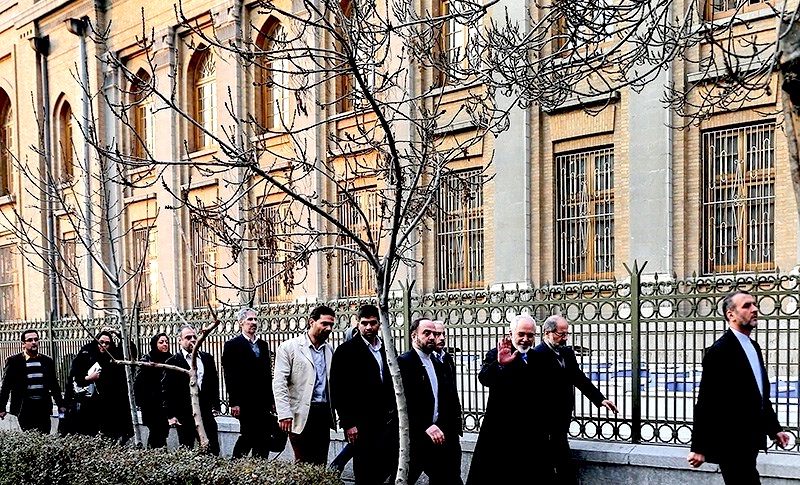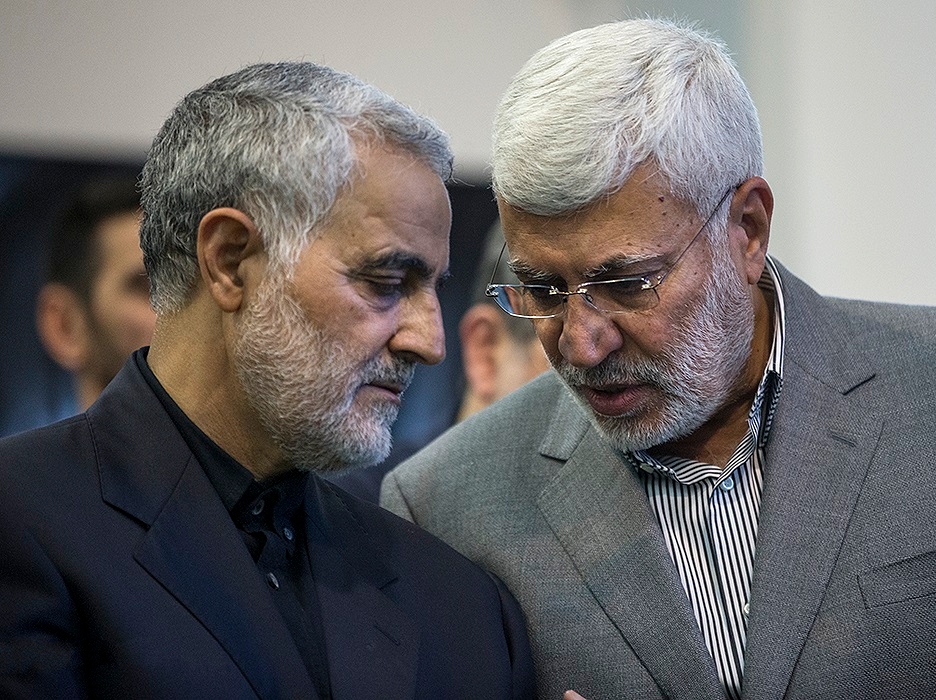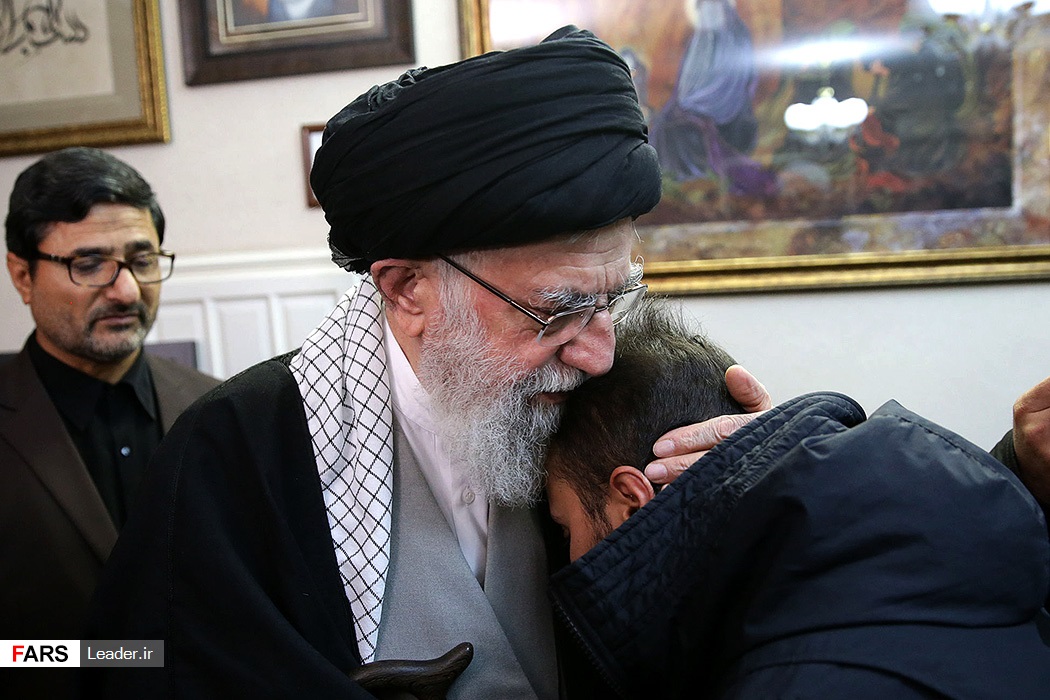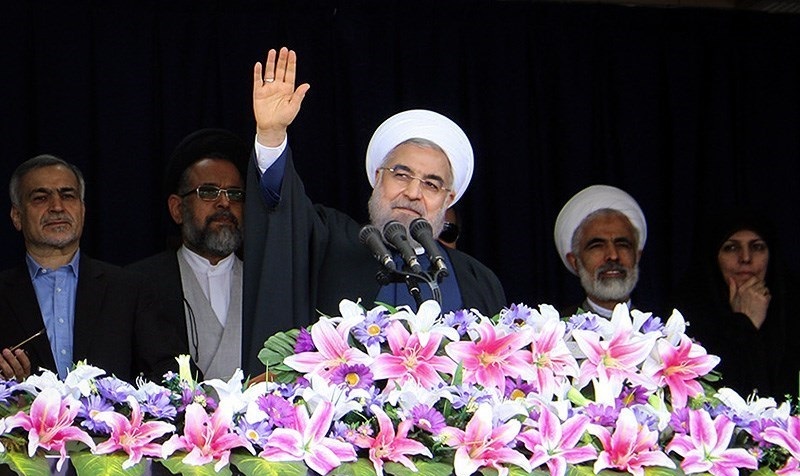Gareth Porter analyzes comments by Iran’s foreign minister that may portend a different nuclear-dealing posture after the country’s presidential elections in mid-June.

Iran’s Foreign Minister Javad Zarif waving outside of Iran’s Ministry of Foreign Affairs in 2015. (Tasnim News Agency, CC BY 4.0, Wikimedia Commons)
By Gareth Porter
Special to Consortium News
A leak of remark s by Iranian Foreign Minister Javad Zarif has brought to light serious conflicts he had on foreign policy with Qassem Soleimani, the late, charismatic head of the Islamic Revolutionary Guard Corps (IRGC) Quds Force and, more importantly, revealed dramatic new evidence of the IRGC’S much greater power within the Iranian establishment.
s by Iranian Foreign Minister Javad Zarif has brought to light serious conflicts he had on foreign policy with Qassem Soleimani, the late, charismatic head of the Islamic Revolutionary Guard Corps (IRGC) Quds Force and, more importantly, revealed dramatic new evidence of the IRGC’S much greater power within the Iranian establishment.
That shift in political balance has made it very likely that the mid-June Iranian presidential election will bring to power a figure much closer to the IRGCs views on the nuclear deal.
The signs of a move away from a pragmatist approach to the United States and the nuclear issue to a more hard-line anti-U.S. posture pose clear dangers of a new, far more serious U.S.-Iran crisis in the relatively near future. It is the consequence of U.S. interventions in Iraq and Syria that contributed indirectly to the enormously increased popularity of IRGC Quds Force and its commander Soleimani, who was assassinated by the United States in January 2020.
Among other revelations in excerpts leaked from three hours of a seven-hour interview for an historical archive, Zarif said that Soleimani exploited the lifting of sanctions in 2015 to sabotage the JCPOA nuclear deal by using civilian Iranian planes to carry military equipment and personnel to Syria without informing him and that neither he nor President Hassan Rouhani were informed about Soleimani’s trip to Moscow in August 2015, which he suggested was aimed in part at sabotaging the nuclear deal.
The leaked tapes were not the first indication of Zarif’s strong objection to the encroachment on his responsibilities. He had complained publicly in 2019 about not having been informed of the visit of Syrian President Bashar al-Assad to Tehran.
Please Support Our Spring Fund Drive!
Zarif’s comments, clearly not meant for publication, were leaked to an anti-Iran, pro-Saudi television outlet in London, apparently by someone hoping to damage him politically. The widespread news coverage of his complaints prompted Supreme Leader Ali Khamenei to deliver a stinging attack on Zarif’s remarks as “a repetition of what Iran’s enemies say.”
Zarif’s leaked comments clearly reflect the degree to which the IRGC Quds Force and their commander have acquired most of the power and responsibilities previously vested in the Foreign Ministry and even overshadow the presidency. But that momentous shift in power toward the IRGC has not occurred in a political vacuum. It is the result of the serious threats to Iran’s security in Iraq and Syria in recent years that have given rise to the highest profile Quds Force military missions thus far and to the unprecedented popularity of Gen. Soleimani.
How Iraq & Syria Changed Iran’s Power Equation

Iran’s Qasem Soleimani (left) with Abu Mahdi al-Muhandis (right), an Iraqi commander, in 2017 in Tehran. They were both killed by a U.S. targeted drone strike in January 2020. (Fars News Agency, CC BY 4.0, Wikimedia Commons)
After the Islamic State seized a third of Iraqi territory in 2014, and the U.S.-supported Iraqi Army had failed to put up any effective resistance to it, ISIS was seen by Iranians as a mortal threat to Iran. As a result there was overwhelming popular support in Iran for a military intervention by the Quds Force to stop the offensive, even among Iranians who had not previously been well-disposed toward the IRGC. It was the role of Soleimani and the Quds Force in training and leading the Popular Mobilization Forces, a rapidly-formed coalition of Shiite militias, that led to the defeat of the Islamic State offensive.
But it was in Syria that the Quds Force played its biggest and most direct military role in the region after the United States and its Sunni allies posed yet another threat to Iran’s vital security interests by agreeing on organizing and arming military forces to overthrow the Assad regime. The Quds Force, Hezbollah and the Syrian army ultimately defeated anti-Assad forces armed by Saudi Arabia, Qatar and Turkey, with Obama administration approval and assistance, even after most of the arms and the most of the rebel forces had come under the control of al Qaeda’s Syrian branch, al Nusra Front. Then Israel began systematic air attacks on Iranian targets in Syria.
The battles in Syria and Iraq were both vital to Iran’s ability to deter the threat of an air attack on Iran, which had been made repeatedly by Israel and the United States. In response to Israeli threats to Iran in the mid- to late 1990s, the IRGC developed a conventionally-armed missile, the Shahab-3, as a deterrent. But IRGC officials in charge of Iranian ballistic missiles were doubtful about its reliability as well as its range, so they began shipping thousands of missiles and rockets to Hezbollah and Syria as a supplement to the deterrent.
That policy has continued down to the present. In August 2019, former Iranian Deputy Foreign Minister Hossein Sheikholeslam, declared that Iran had deployed a total of 150,000 Iranian missiles in Lebanon, Syria and Gaza, which he said “constitute our greatest deterrence against America and Israel.” The Israeli military estimated 120,000 total Hezbollah missiles and rockets as of September 2017.
The result of these major IRGC operations in Iraq and Syria was to make Soleimani the Islamic Republic’s first genuine national hero, whose martyrdom in January 2020 produced an unprecedented popular outpouring of millions of Iranians in a funeral procession that spread over several days and in several Iranian cities. Equally important, Soleimani was also extremely close to Supreme Leader Khamenei, who treated him not like an ordinary commander but as the de facto chief of the country’s national security.

Iran’s AyatollahAli Khamenei consoles one of General Soleimani’s sons. (Fars News Agency, CC BY 4.0, Wikimedia Commons)
The popular adoration for Soleimani and his intimacy with Khamenei cannot be transferred to Soleimani’s successor as Quds Force commander, but data from the University of Maryland’s public opinion poll of Iranians role a year after the assassination of Soleimani shows that he helped solidify support for IRGC generally. A majority say that if Iran were to reduce IRGC activities in the region, the United States would only make further demands on Iran. It also shows that three out of five Iranians support an IRGC role in the economy.
IRGC as Wild Card in Iran’s Ban on WMD
Zarif’s remarks suggested that differences with the IRGC over the JCPOA and the nuclear weapons issue have been a key part of the struggle over Iran’s foreign policy. The history of IRGC involvement in foreign policy began when Iranians were exposed to an Iraqi attack with mustard gas in 1984. The then minister of military procurement, Mohsen Rafighdoost, one of earliest members of the IRGC, proposed to Iran’s supreme leader at the time, Ayatollah Ruhollah Khomeini, a program of chemical, biological and nuclear weapons. But as Rafighdoost recounted to this writer in a September 2014 interview, Khomeini forbade any weapons of mass destruction as inconsistent with Islam.
After Iranian cities were emptying in fear of an Iraqi chemical attack in 1987, Rafighdoost took the initiative to obtain the chemical precursors for mustard gas and then went back to Khomeini again to seek his approval for what he called “this capability to retaliate.” But Khomeini again said it was “haram” (forbidden) to produce such weapons, and repeated his order forbidding work on nuclear weapons, according to Rafighdoost.

Iranian President Hassan Rouhani during a visit of Semnan Province, 2016. (Tasnim News Agency, CC BY 4.0, Wikimedia Commons)
That same tension between Iran’s Shiite religious principles and the IRGC’s focus on Iran’s military requirements surfaced again just a decade later. Khomeini’s successor as supreme leader, Khamenei, had publicly articulated an argument against nuclear weapons on pragmatic national security grounds, because it was not matter of public debate. But at least one senior IRGC researcher believed that Iran needed to have the technical capability to produce nuclear weapons, and, like Rafighdoost during the Iran-Iraq War, he and others undertook research on the problem on their own, as was discussed openly by a key Khamenei ally with The San Francisco Chronicle.
It was Rouhani, then Khamenei’s nuclear coordinator in 2003, who ended that IRGC officer’s project, along with other unauthorized nuclear projects, by cutting off their funding, as a senior IRGC official complained in a conversation intercepted by U.S. intelligence in 2007.
Now, the IRGC is in direct conflict with Rouhani once again, because leading IRGC officials have made little secret of their disapproval of the nuclear deal. Brigadier General Yadollah Javani, the head of the political bureau of the IRGC, has declared that, based on the U.S. record in regard to the JCPOA, the Guard believes Iran “should not think of any negotiations with the United States any longer.”
Based on the opinion survey carried out in February for the University of Maryland, moreover, Iranian public opinion has moved closer to the IRGC’s view of the U.S. and the nuclear deal. Seventy-five percent support a recent law requiring the government to allow fewer international inspections unless the U.S. meets its obligation under the JCPOA. Sixty percent of respondents in that poll say the next president should be someone who is critical of Rouhani’s policies.
It now seems very likely that next month’s presidential election in Iran will elect a conservative critic of Rouhani and Zarif who is more closely aligned with the IRGC’s views on the nuclear deal and the United States. With the Biden administration committed to the long-term U.S. policy of unrelenting economic and military pressure on Iran over its nuclear program, the United States is headed toward yet another — potentially even more dangerous — U.S.-Iran crisis. Meanwhile, the Iran nuclear issue is based on a fiction created and kept alive by Israel in one of history’s most successful campaigns of deception.
Gareth Porter is an independent investigative journalist who has covered national security policy since 2005 and was the recipient of Gellhorn Prize for Journalism in 2012. His most recent book is The CIA Insider’s Guide to the Iran Crisis, co-authored with John Kiriakou, published in February.
The views expressed are solely those of the author and may or may not reflect those of Consortium News.
Please Support Our
Spring Fund Drive!



By now, public opinion of the whole world has moved closer to the IRGC’s view of the U.S.
So long as the USA and my own UK government persist in keeping (and now upgrading and increasing) their arsenals of nuclear weapons, they haven’t any right to even say one word against Iran. If Iran wishes to build thousands of nuclear weapons in response to the obvious dangers posed by nuclear-armed, belligerent, aggressive, apartheid Israel, then it has a moral right to do so until those three nations dismantle their own arsenals. This is the obvious outcome and failure of their deterrence policy.
Thanks to Gareth. The harm done by the USA and Israel, claiming to desire security and safety, is clearly seen in the rational reactions of different important groups in Iran. The constant belligerent, arrogant behavior of the USA under a “different” POTUS whose obedience to Israel has just been shown to be unchanged from that of the derided Trump,can only lead to greater conflict which is of no benefit to the vast majority of human beings in the region in and near Iran, or to the USA except the usual MIC and corporations.
Thanks as always, Gareth. I look forward to your insights being expressed here. And as always, gain in knowledge I can trust as being factual when I do. We all owe you and Consortium News for continuing to ‘bring it.’
Thanks so much, David. I’m grateful for your interest .
Would that the “leaders” in the US were capable of reading and understanding this article. As it has with other countries, US policy is turning Iran into a strong foe rather than finding a way to work together in a way that’s at least acceptable to both nations. The empire’s actions have strengthened the IRGC, similar to how Israel has strengthened Hamas. It’s a cartoonish way of trying to conduct foreign policy.